12 Mar, 2008
Hunting
I went out onto the sea ice for the first time since I came to Grise Fiord. The ice is 5 feet thick. The sea is frozen all the way to the other side of the straight to Devon Island. Norman whom I had met earlier in the school library invited me to come along as he was going to go hunting with his son, Kyle, for the last time before they move to Pond Inlet. We went by a skidoo (snow mobile) as far as 15 kilometers to the point where the old village was, pulling a wooden sled with a fabric canopy on the top. In the minus thirty-four temperature with the wind, it feels even 20 degree colder, and though I was dressed like a butter ball, it was just about right.
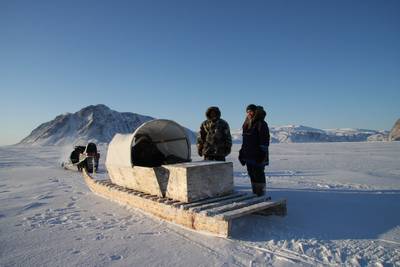
We went by a skidoo, pulling a sled with a topper
There are some hunters in the village who have sled dogs. It is because there is a law that you have to go by a dog sled to guide sports hunters for polar bear hunting, and besides, unlike a machine which can break down, dogs are more reliable and they could save your life in the worst case. Norman used to have dogs, but as he has to work hauling water by truck to the whole village in a day time, it was a little too much, and he switched to a skidoo.
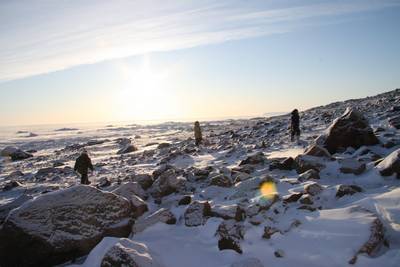
The spot where the old village was.
Norman's cousin Venessa who will be 18 came with us, too. Dressed in the mittens with brown, thick fur of Beaver and beautiful purple parka which she made herself, she is a young woman hunter who has hunted ptarmigans and caribou as well. It is not like every woman in Grise Fiord hunts. In case of Pauline, when she went out hunting with her father when she was little, her eyes met with the eyes of a seal which popped out of a hole in the ice, and so cute were its eyes, she cannot hunt ever since, she said. (But she added, eating is a different story.)
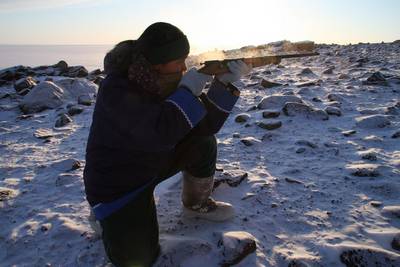
Venessa aiming a shot
Someone may be good at making clothes, and others may be good hunters, or someone may be a good baby sitter, Inuit people say that it is a very important thing in their way of life that each one of them does his or her share of work and help each other. It is not only a work that is necessary to provide minimum livelihood such as hunting for food, but also, someone who is good at telling stories for instance is valued as indispensable talent, and was an asset for him or her.
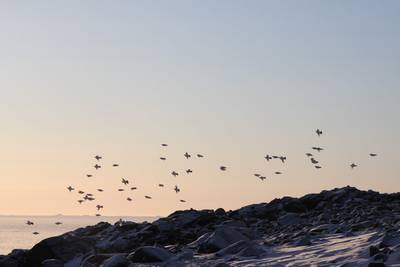
Ptarmigans flying up.
As we were going after ptarmigans through a rocky place with deep snow, we found fresh tracks of a musk ox, and further we went, we came across an old polar bear trap before guns came and also an arctic fox trap. As we tried to stalk on a flock of ptarmigans, and saw them fly up at a gun shot without a success, I started thinking that we would go home empty-handed. Then Vanessa shot a hare. Its fur being pure white and fluffy, the arctic hare was bigger than any other rabbits I have seen and was heavy when I picked it up.
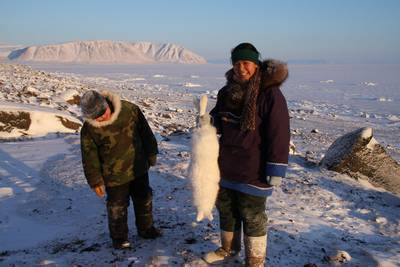
She shot an arctic hare
Today, we have food in our refrigerator even if we go home without catching anything. But at the time when people were depending on what they caught on the land and the sea, I wondered how the hunters felt. Proudly going home with his catch where the family is waiting, or pulling a sadly-light sled when going home empty handed. In either case, I wondered how the villagers would meet the hunter who came home exhausted.
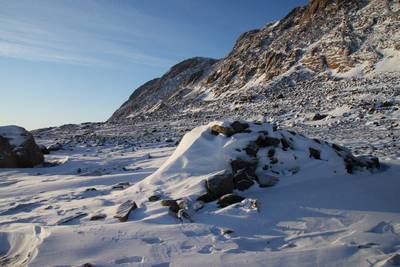
An old polar bear trap. It was used before the gun came. They put bate in the dome of piled up stones to lure a polar bear.
As they are the people who value the sharing mind, they might have met him who came back from a hard work, with a smile of understanding without saying a word. There is no such word like 'Otsukare-sama' in English or Inuktitut. I was thinking about a saying 'a joy becomes double and sadness becomes half when you share it with someone.'
Noriko Miyashita
 HOME
HOME